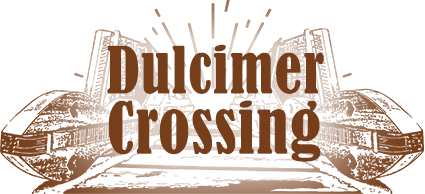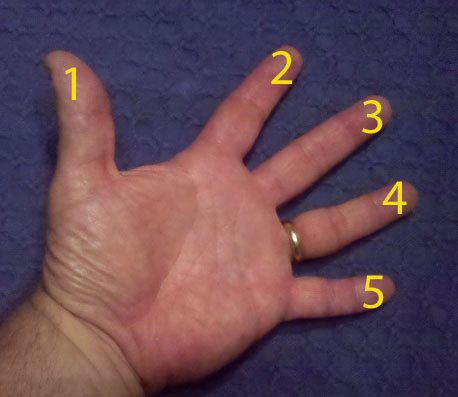How should I practice? The 5 Finger-Regimen
by Steve Eulberg I hear this question all the time from students in my private studio, from my Jamplay.com guitar students and dulcimercrossing.com students. The Five-Finger Practice Regimen is what I always suggest:
It doesn't matter what instrument you play, it will sound better (and therefore encourage your practice) if it is in tune. [Note for hammered dulcimer players: Tune ALL the strings on the instrument, not just the ones you use most!! A significant part of the hammered dulcimer sound is the resonance that comes from sympathetic vibration. If the strings you "aren't playing" are not in tune, that sympathetic vibration will be less than optimal--or worse: out of tune! That will definitely discourage you from playing your dulcimer!.]
2. Warm up.
Play some familiar exercises or tunes on your instrument for a few moments to remind your hands and your brain that you are no longer working on the computer, or washing dishes, or driving kids to school or games.
3. Play the HARDEST piece you are working on.
This might go against your expectation, but let me tell you why I suggest this. Often we play the things we are familiar with until we run out of time or energy, and then the most challenging thing we are working on is forgotten and left until the next time and then the next time....until it is just, well, forgotten. If we play the newest, hardest piece when our minds and hands are fresh, we can focus our energy on it when we are energized and have the greatest possibility for the most progress.
4. Play something familiar.
Then, when your most challenging piece has kicked you around a bit, it is time for a confidence builder. This is when you pull out a tune that you are more familiar with and more confident about playing. [Sometimes, this tune is the one that used to be the hardest piece, that you practiced in the finger before.]
5. Finally, play something that you've memorized.
Many of my students claim that they can't memorize anything, or that they have an extra hard time accomplishing this. If you are practicing regularly, you are undergoing a re-wiring process between your brain and your hands. Tablature and musical notation are terrific tools, but they will never substitute for the repetition that your hands need in order to complete the memorization process. If you've moved a "hard" piece to something "familiar", it is not much further to get it to the "memorized" place. And then, it could become one of your warm-ups!
Categories
- News (6)
- Events (4)
- subscriber news (236)
- uncategorized (6)
- lessons (190)
- mountain dulcimer (203)
- hammered dulcimer (157)
- history (22)
- music theory (40)
- octave (1)
- plagal cadence (1)
- dulci-bro (73)
- fingerpicking (3)
- fingerstyle mountain dulcimer (4)
- nina zanetti (5)
- aeolian (2)
- dorian (4)
- ionian (3)
- lydian (1)
- mixolydian (3)
- modes (2)
- traditional (2)
- tuning (5)
- music education (2)
- NSME (1)
- standards (1)
- drone (3)
- folk alliance (1)
- jonah brody (1)
- koto (1)
- sam lee (1)
- scottish folk song (1)
- linda ratcliff (5)
- practice (29)
- chromatic mountain dulcimer (66)
- dulcimercrossing.com (2)
- erin rogers (7)
- building (8)
- black mountain (1)
- jerry read smith (1)
- Joshua Messick (1)
- song of the wood (1)
- don pedi (5)
- fiddle whamdiddle (9)
- miss mcleod (2)
- steve eulberg (30)
- vi wickam (9)
- buying (1)
- choosing (1)
- purchasing (1)
- orphan girl (1)
- copyright (1)
- amplification (2)
- contact pickup (1)
- eulberg (4)
- microphone (2)
- pickup (2)
- berkeley (1)
- colorado (2)
- festivals (4)
- kentucky (1)
- scholarship (1)
- western carolina (1)
- noter (2)
- clubfooted jib (1)
- dgd (2)
- dgd tuning (1)
- special event (31)
- david massengill (2)
- reverse ionian (1)
- chuck boody (1)
- concertina (1)
- deedee tibbits (1)
- dulcimer (7)
- evart (1)
- evart funfest (1)
- linda foley (1)
- michigan (1)
- original dulcimer players club (1)
- fingerstyle (11)
- gebhard woods (1)
- technique (1)
- harmonics (1)
- dan delancey (2)
- june apple (1)
- linda thomas (3)
- modal (1)
- expression (1)
- playing expressively (1)
- dulcimer pledge (1)
- christmas (2)
- nativity (1)
- DAC (2)
- minor more (1)
- mississippi sawyer (1)
- holiday (5)
- joy to the world (1)
- jingle bells (1)
- reverse ionion (1)
- hand independence (1)
- hand separation (1)
- lullabye of muffe (1)
- tina gugeler (1)
- absolute beginner mountain dulcimer (1)
- beginner (2)
- mountain (3)
- string-side up (1)
- absolute beginner hammered dulcimer (1)
- blog (2)
- dulcimercrossing. (1)
- topics (1)
- blues (4)
- resonator (4)
- dulcimer orchestra (2)
- kitty puss (1)
- mike clemmer (1)
- noter style (2)
- jam survival (7)
- butch ross (3)
- looping (1)
- intro (4)
- neal hellman (4)
- erin mae lewis (9)
- rehearsal (3)
- italian (1)
- lauda (1)
- irish (1)
- slipjig (1)
- rhythm (2)
- robert force (2)
- tuner (1)
- exercises (1)
- scales (1)
- devotions (3)
- hark advent (1)
- the glad sound! (1)
- chords (3)
- chromatic (4)
- erin (1)
- theory (7)
- advent (5)
- preparation (4)
- stir up (1)
- appalachia (4)
- hillbilly (1)
- mountains (1)
- traditional music (1)
- dampers (1)
- hearts of the dulcimer (3)
- patricia delich (2)
- wayne jiang (2)
- appalachian (1)
- John Jacob Niles (1)
- Live Events (28)
- Premium Level Membership (2)
- habits from the muse (1)
- progress (6)
- support (2)
- Anna Muckova (1)
- cimbalom (1)
- CWA (1)
- Czech Republic (1)
- Magdalena Muckova (1)
- nonsuch (1)
- Slovak Republic (1)
- podcast (1)
- aubrey atwater (2)
- jean ritchie (2)
- log-in (1)
- update (1)
- lucky (1)
- performance (9)
- preparing (1)
- study (1)
- dulcimers (1)
- wendy songe (2)
- bluegrass (2)
- growth (1)
- resolutions (2)
- risks (1)
- capo (1)
- snark (1)
- fiddle (61)
- criticism (2)
- judy klinkhammer (1)
- miles davis (2)
- wrong note (1)
- live and let live (1)
- style (1)
- barlow knife (1)
- old school old-time (2)
- marie kirby (1)
- bass mountain dulcimer (1)
- elaine conger (1)
- larry conger (1)
- practice smarter (8)
- musical journey (1)
- piano (1)
- calm (1)
- dog (1)
- su la li (1)
- bluebird cafe (1)
- inspiration (3)
- new input (2)
- trust (1)
- practice space (2)
- quite (1)
- how to practice (8)
- you are what you practice (1)
- workshop (5)
- rich chords (2)
- kaitlin pabo-eulberg (1)
- hooked on dulcimers (1)
- humor (1)
- blue water thinking (1)
- creativity (2)
- environment (2)
- original tunes (1)
- 1+ fret (1)
- chopin (1)
- classical (1)
- assessment (1)
- skill levels (1)
- waltz (1)
- caledonian club (1)
- ensemble (1)
- group (1)
- dulci-tune (1)
- tuning game (1)
- love (2)
- workout (1)
- learning (8)
- teacher (6)
- self-taught (1)
- how long (1)
- jam sessions (6)
- learn to play (1)
- strategies (2)
- fariña (1)
- mimi (1)
- pete seeger (2)
- rainbow quest (2)
- goals (1)
- planning (1)
- backing tracks (6)
- matthew dickerson (2)
- concert (1)
- erin mae (2)
- guitar (5)
- deborah hamouris (3)
- dj (2)
- freight and salvage (1)
- classic (1)
- licks (1)
- rock (1)
- berkeley dulcimer orchestra (1)
- premiere (1)
- banjo (1)
- frank proffitt (1)
- frank warner (1)
- tom dooley (1)
- baker (1)
- binding (1)
- blue lion (1)
- bob (1)
- gluing (1)
- janita (1)
- live (1)
- tips (1)
- spouse (1)
- amplified (1)
- DI box (1)
- digital interface (1)
- sound reinforcement (1)
- 2nd Set Concert (2)
- contest (1)
- flash mountain dulcimer brigade (2)
- JimJim & the FatBoys (1)
- Pecan Grove (1)
- walnut valley festival (2)
- winfield (1)
- wvfest (1)
- thinking (1)
- case (1)
- cross-legged (1)
- grip (1)
- safe dulcimer (1)
- sit (1)
- slip (1)
- stand (1)
- stool (1)
- strap (1)
- learn (3)
- mistakes (1)
- successes (2)
- herbie hancock (1)
- improvising (1)
- jazz (2)
- lois hornbostel (2)
- wrong chord (1)
- atlantic (1)
- barbara allen (1)
- frank profitt (1)
- scots-irish (1)
- chord wizard (1)
- diatonic (2)
- equi-distant (3)
- tom strothers (1)
- tool (2)
- busker (1)
- tsimbaly (1)
- ukraine (1)
- ukrainian (1)
- calendar (1)
- schedule (1)
- baritone (1)
- concert window (3)
- katie moritz (1)
- faq (1)
- frequently asked questions (1)
- logged in (1)
- navigation (1)
- old time (1)
- patreon (1)
- shape-note (1)
- special (1)
- carrell (1)
- geoff reeve-black (1)
- malvern (1)
- presnell (1)
- articulations (1)
- chicken reel (1)
- conger (1)
- soldier's joy (1)
- basic level membership (1)
- caring for your instrument (1)
- winter weather (1)
- god rest ye (1)
- rhythmic displacement (1)
- builder (1)
- tam kearney (1)
- toronto (1)
- don neuhauser (1)
- slide (1)
- ashley ernst (1)
- dan and angie landrum (1)
- dpn (1)
- dulcimer players news (1)
- dulcimersessions.com (1)
- maddie macneil (1)
- arkansas traveler (1)
- Mark Alan Wade (2)
- 3d playing (1)
- playing across the strings (2)
- chord symbols (1)
- understanding chords (3)
- dulcimer club (1)
- class (1)
- habits (1)
- skills (1)
- jimmy driftwood (1)
- failures (1)
- hours (1)
- youtube (1)
- arranging (1)
- bill robinson (1)
- cold winter night (1)
- karen mueller (3)
- jig (1)
- DAd tuning (1)
- hyfrydol (1)
- hymn (1)
- 2020 (1)
- premium (1)
- gounod (1)
- hitchcock (1)
- dan evans (1)
- spotted pony (2)
- steveeulberg (1)
- nylon-string (1)
- stephens lutherie (1)
- musical devotions (1)
- award (1)
- fernando sor (1)
- hammered (1)
- understanding (1)
- lent (1)
- leap forward (1)
- power of music (2)
- News (10)
- Events (4)
- mountain dulcimer (147)
- hammered dulcimer (151)
- chromatic mountain dulcimer (8)
- sharing (1)
- persistence (5)
- Practice (4)
- routine (1)
- tour (1)
- new website (1)
- arrranging (1)
- celtic (1)
- single jig (1)
- mountain dulcimer (3)
- busking (1)
- audio (1)
- playback (1)
- protection (1)
- adaptations (1)
- dulcimer acquisition syndrome (1)
- dulcimer acquisition disease (1)
- contests (1)
- lessons (1)
- identify (1)
- apps (1)
- motivation (1)
- hands (1)
- In Memoriam (1)
- guitar (1)
- archive (1)
- concerts (1)
- mountain dulcimer (2)
- hammered dulcimer (1)
- lessons (1)
- workshops (1)
- self-assessment (1)
- learn (1)
- greek (1)
- mindset (3)
- accountability (2)
- encouragement (1)
- prodding (1)


1 comment
Leave a comment
Please log in or register to post a comment